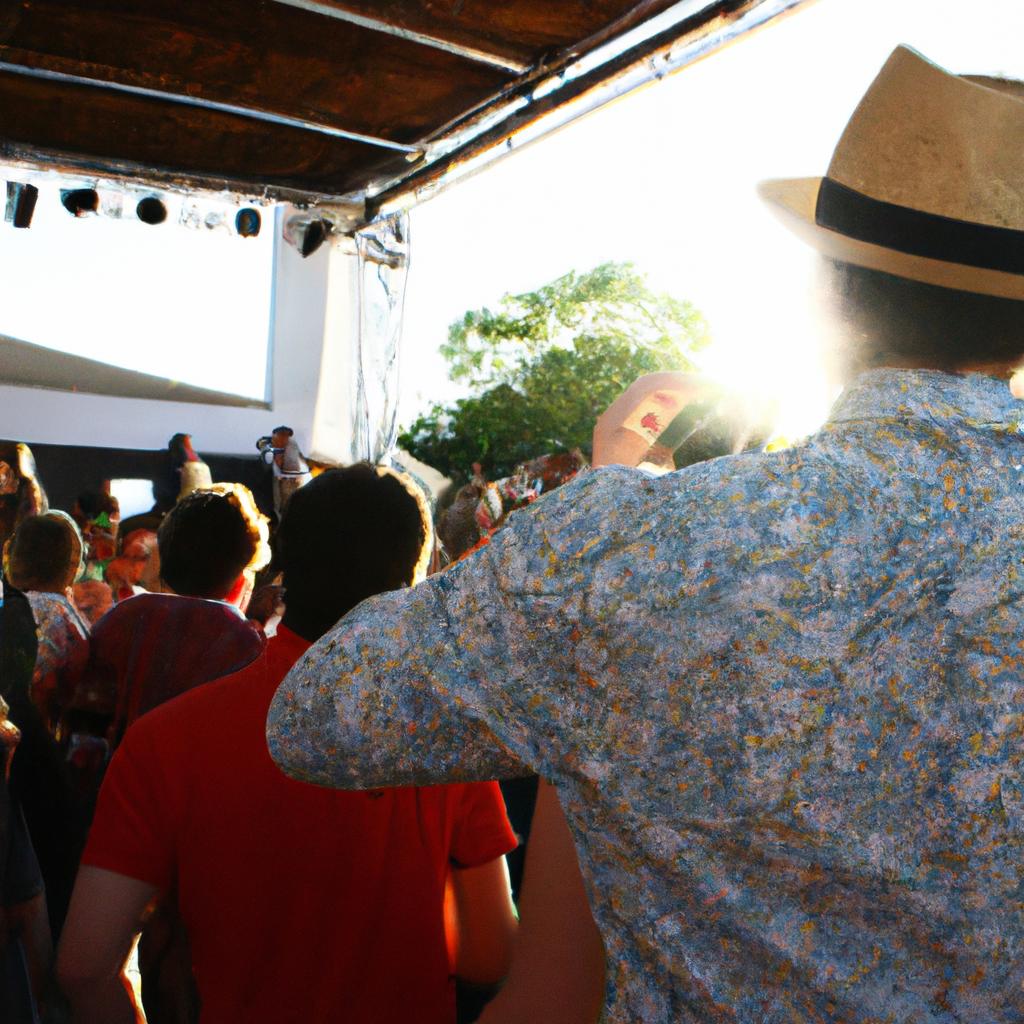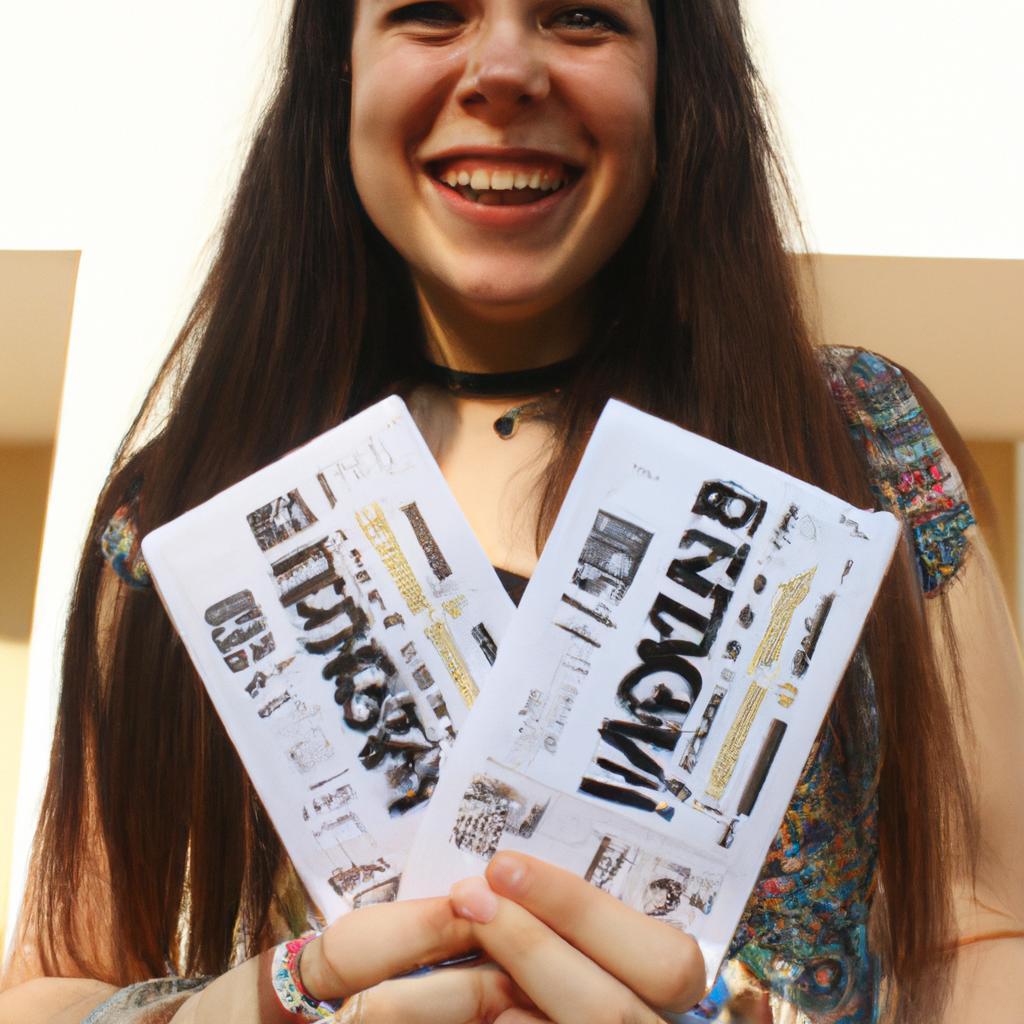Music festivals have become a prominent form of entertainment throughout the world, offering diverse experiences for music enthusiasts. These events provide a platform for showcasing various genres and styles of music, catering to different preferences and tastes. One compelling example is the Glastonbury Festival in Somerset, England, which attracts thousands of attendees each year with its eclectic lineup featuring artists from rock, pop, hip-hop, electronic dance music (EDM), and more.
The diversity of music festivals can be observed through the range of themes and formats they adopt. Some festivals focus on specific genres such as jazz or classical music, while others encompass a broader spectrum by incorporating multiple genres into their programming. For instance, Coachella Valley Music and Arts Festival in California showcases an array of musical acts spanning across alternative rock, indie pop, EDM, rap/hip-hop, and R&B. This wide variety allows festival-goers to explore different sounds and expand their musical horizons.
Additionally, music festivals often incorporate other forms of artistry beyond just live performances. Visual arts installations, interactive exhibits, culinary experiences, and immersive environments are becoming increasingly prevalent elements within these events. The integration of various artistic mediums creates a multisensory experience that enhances the overall atmosphere and provides attendees with unique opportunities for engagement and self-expression. For example, Burning Man in Nevada is not just a music festival but also an experiment in community and radical self-expression. Attendees are encouraged to participate by creating art installations, performing live music, or showcasing their talents in other creative ways. This collaborative environment fosters a sense of camaraderie and allows individuals to contribute to the overall aesthetic and vibe of the festival.
Furthermore, music festivals often serve as platforms for emerging artists to gain exposure and connect with new audiences. Many festivals feature dedicated stages or showcases specifically designed to showcase up-and-coming talent. This provides aspiring musicians with invaluable opportunities to perform in front of larger crowds and potentially catch the attention of industry professionals. In this way, festivals can play a crucial role in nurturing talent and contributing to the vibrancy and evolution of the music industry as a whole.
In conclusion, music festivals offer diverse experiences for attendees, ranging from showcasing various genres of music to incorporating different forms of artistry beyond live performances. They provide platforms for both established and emerging artists while allowing individuals to explore new sounds and expand their musical horizons. With their immersive environments and collaborative atmospheres, these events have become significant cultural phenomena that bring people together through shared passions for music and creativity.
Rock music festivals
Rock music festivals have become a popular form of entertainment for music enthusiasts around the world. One example is the renowned Glastonbury Festival in England, which has been attracting rock music fans since its inception in 1970. These festivals provide a platform for both established and emerging rock bands to showcase their talent and connect with their audiences on a grand scale.
One key characteristic of rock music festivals is the diverse range of musical acts they feature. From classic rock bands like The Rolling Stones to alternative rock groups such as Arctic Monkeys, these events cater to various subgenres within the broader spectrum of rock music. This diversity allows attendees to explore different styles and appreciate the multifaceted nature of rock as a genre.
To further emphasize this point, we can consider four aspects that make rock music festivals an emotionally charged experience:
- Intense energy: Rock concerts are often characterized by high-energy performances, where musicians engage with passionate crowds through powerful vocals, electrifying guitar solos, and energetic stage presence.
- Emotional connection: Many people associate certain songs or lyrics with significant moments in their lives. At rock festivals, hearing those favorite tunes performed live creates a sense of nostalgia and emotional connection between artists and audience members.
- Sense of community: Attending a festival surrounded by like-minded individuals who share a love for rock music fosters a strong sense of camaraderie among attendees. It provides an opportunity for social interaction and bonding over shared experiences.
- Liberation from everyday life: Rock festivals offer an escape from mundane routines and allow participants to immerse themselves fully in the moment. The combination of live performances, vibrant atmospheres, and enthusiastic crowds create an exhilarating environment that transports individuals into an alternate reality.
To better visualize the impact of these emotional aspects at rock festivals, consider the following table:
| Aspect | Impact |
|---|---|
| Intense energy | Electrifying performances leave attendees feeling energized and invigorated. |
| Emotional connection | Nostalgia and personal memories associated with certain songs enhance emotional engagement. |
| Sense of community | Shared experiences foster a sense of belonging and strengthen social connections among attendees. |
| Liberation from everyday life | The immersive environment allows individuals to let go of their worries and experience pure enjoyment. |
In conclusion, rock music festivals provide an exhilarating experience for music lovers by showcasing diverse genres within the rock category while evoking intense emotions in attendees through memorable performances, fostering a sense of community, and offering an escape from everyday life. As we transition into the next section on electronic music festivals, it is important to note that these events offer a distinctively different atmosphere and style of entertainment.
Electronic music festivals
While rock music festivals have captivated audiences with their energetic performances and rebellious spirit, electronic music festivals offer a completely different experience. With pulsating beats and immersive visuals, these events immerse attendees in an electrifying atmosphere that is distinctive to this genre.
Section – Electronic music festivals:
One example of a renowned electronic music festival is Ultra Music Festival. Held annually in Miami, Florida, it showcases some of the biggest names in electronic dance music (EDM) across multiple stages. This three-day event attracts thousands of enthusiasts who come together to celebrate their love for EDM through dynamic performances and cutting-edge production techniques.
When attending an electronic music festival, participants can expect:
- High-energy performances by world-class DJs
- State-of-the-art sound systems that deliver powerful basslines and intricate melodies
- Mesmerizing visual displays including LED screens, laser shows, and pyrotechnics
- A vibrant community united by their passion for electronic music
| Aspects | Description |
|---|---|
| Performances | Energetic sets by renowned DJs |
| Sound Systems | Cutting-edge technology delivering impactful audio |
| Visual Displays | Stunning visuals such as LED screens, lasers, and pyrotechnics |
| Community Spirit | A sense of unity among attendees sharing a common love for electronic music |
Attending an electronic music festival allows individuals to escape into a realm filled with pulsating beats and mesmerizing visuals. These events provide a platform for self-expression while fostering a strong camaraderie within the community. The energy radiated throughout the crowd creates an exhilarating ambiance that keeps fans coming back year after year.
As we explore the diverse array of music festivals, it is essential to recognize the unique atmosphere and rich history of jazz and blues music festivals. These events pay homage to two iconic genres that have influenced musical landscapes for decades.
Jazz and blues music festivals
Moving on from the pulsating beats of electronic music, let us now explore another vibrant genre that has captivated audiences worldwide – jazz and blues.
One fascinating example that showcases the allure of jazz and blues music festivals is the renowned New Orleans Jazz & Heritage Festival. This annual event brings together talented musicians from various corners of the globe to celebrate the rich history and cultural significance of jazz and blues in one of America’s most iconic musical cities.
To truly appreciate the diversity found within jazz and blues music festivals, it is important to understand some key characteristics:
-
Genre Fusion:
- Jazz and blues festivals often incorporate elements from other genres such as rock, soul, or funk.
- This fusion creates a unique sound that appeals to a wide range of listeners.
-
Improvisation:
- A hallmark feature of both jazz and blues music is improvisation.
- Musicians showcase their creative prowess by spontaneously developing melodies during performances.
-
Emotional Expression:
- Jazz and blues have an incredible ability to evoke deep emotions.
- From joyous swing rhythms to melancholic ballads, these genres offer a powerful means for artists to express themselves.
-
Cultural Relevance:
- Many jazz and blues festivals serve as platforms for highlighting cultural heritage.
- They provide opportunities to honor influential musicians while nurturing new talent.
Table showcasing notable jazz and blues festivals around the world:
| Festival Name | Location | Year Established |
|---|---|---|
| Montreux Jazz Festival | Montreux, Switzerland | 1967 |
| Chicago Blues Festival | Chicago, USA | 1984 |
| North Sea Jazz Festival | Rotterdam, Netherlands | 1976 |
| Umbria Jazz Festival | Perugia, Italy | 1973 |
As we delve into the vibrant world of jazz and blues music festivals, it becomes evident that these events are not just about entertainment; they serve as cultural touchstones. The fusion of genres, improvisation, emotional expression, and celebration of diverse heritage all contribute to making jazz and blues festivals an immersive experience for both musicians and audiences alike.
With a deep appreciation for the melodic expressions found in jazz and blues festivals, let us now explore another genre that has captured the hearts of millions – country music.
Country music festivals
Continuing our exploration of the vibrant world of music festivals, we now turn our attention to country music festivals. These events provide an immersive experience for fans of this beloved genre. Let us delve deeper into the characteristics that distinguish country music festivals from other types of musical gatherings.
Section – Country Music Festivals:
One example is the renowned Nashville Country Music Festival held annually in Tennessee, USA. This festival brings together some of the biggest names in country music, such as Luke Bryan and Carrie Underwood, creating a memorable showcase for both established artists and rising stars within the industry.
Characteristics that define country music festivals include:
- Cultural Identity: Country music holds great significance as it reflects not only personal experiences but also cultural narratives deeply rooted in rural communities. By celebrating this genre through dedicated festivals, attendees can connect with their heritage while embracing the unique traditions associated with country living.
- Sense of Community: With its emphasis on storytelling and heartfelt lyrics, country music often fosters a strong sense of community among fans. Country music festivals capitalize on this by offering spaces where folks who share similar values and interests can come together to enjoy performances, engage in activities like line dancing or BBQ cook-offs, and forge lasting connections.
- Laid-back Atmosphere: One characteristic that sets country music festivals apart is their relaxed ambiance. Attendees are encouraged to kick back, don their favorite cowboy boots or hats, and immerse themselves in a carefree atmosphere filled with live performances and good-natured camaraderie.
- Variety within Subgenres: While all falling under the umbrella term ‘country,’ there exists a wide spectrum of subgenres within this musical style—ranging from traditional honky-tonk to contemporary pop-infused tracks. Country music festivals cater to diverse tastes by featuring artists from various subgenres, ensuring a well-rounded experience for attendees.
| Country Music Festival | Location | Headliners |
|---|---|---|
| Nashville CMF | Tennessee, USA | Luke Bryan, Carrie Underwood |
| Austin Rodeo | Texas, USA | George Strait, Miranda Lambert |
| Stagecoach | California, USA | Eric Church, Thomas Rhett |
| CMA Fest | Tennessee, USA | Blake Shelton, Keith Urban |
In conclusion:
Country music festivals provide an immersive experience that celebrates cultural identity while fostering a sense of community. With their laid-back atmosphere and inclusion of various subgenres within the country spectrum, these events offer something for everyone. As we move forward in our exploration of different types of music festivals, let us now venture into the realm of world music festivals.
Building upon the diversity showcased in country music festivals, we now expand our horizons to explore the rich tapestry of sounds found at world music festivals.
World music festivals
Transitioning from the previous exploration of country music festivals, we now turn our attention to another vibrant facet of the music festival landscape – world music festivals. These events celebrate the rich tapestry of musical traditions from around the globe, offering a unique and immersive experience for attendees.
Imagine yourself at an enchanting world music festival nestled in a lush forested setting. As you enter the grounds, the air is filled with an intoxicating blend of rhythms and melodies emanating from multiple stages scattered throughout the venue. Performers adorned in colorful garments dazzle audiences with their spirited dances and soul-stirring songs. This captivating atmosphere transports visitors on a global journey through diverse cultures and musical expressions.
To better understand the essence of world music festivals, let us explore some key characteristics that make these events so special:
- Cultural diversity: World music festivals showcase artists from various countries and regions, providing a platform for lesser-known genres and traditions to be celebrated alongside more mainstream acts.
- Fusion collaborations: Many world music festivals encourage cross-cultural collaborations between musicians, resulting in innovative fusions that transcend boundaries and create truly unique performances.
- Interactive workshops: Attendees can participate in workshops where they learn traditional dance moves or play exotic instruments under the guidance of seasoned performers.
- Global cuisine: Alongside musical delights, world food stalls offer tantalizing dishes representing different culinary traditions worldwide, allowing festival-goers to savor flavors from across continents.
In this dynamic environment, connections are forged among people from different backgrounds who share a love for cultural exchange through music. To further illustrate this point, consider Table 1 below which highlights notable world music festivals around the globe:
Table 1: Notable World Music Festivals
| Festival Name | Location | Genre Focus |
|---|---|---|
| WOMAD (World of Music…) | United Kingdom | Global Fusion |
| Rainforest World Music… | Malaysia | Indigenous and Folk |
| Sauti za Busara Festival | Zanzibar | African Traditional and Jazz |
| FMM Sines Festival | Portugal | Contemporary World Music |
As we conclude our exploration of world music festivals, it is clear that these events are more than just showcases of diverse musical genres. They serve as platforms for cultural dialogue, fostering a sense of unity and appreciation for the rich tapestry of global music traditions. In the following section, we will delve into alternative and indie music festivals, exploring yet another facet of the multifaceted festival landscape.
Transitioning smoothly to our next topic on alternative and indie music festivals, let us now embark on a journey through the vibrant realm of independent music scenes across various regions.
Alternative and indie music festivals
Moving on from exploring world music festivals, we now turn our attention to the realm of alternative and indie music festivals. These vibrant events offer a unique platform for emerging artists and showcase diverse musical genres that may not always receive mainstream recognition.
Case Study: Imagine an idyllic outdoor setting, surrounded by lush greenery and bathed in the warm glow of sunset. As attendees gather at an independent music festival, they eagerly anticipate performances from both established indie bands and up-and-coming artists. The atmosphere is electric with excitement as the crowd immerses themselves in a rich tapestry of sounds that defy conventional categorization.
These alternative and indie music festivals provide a much-needed space for musicians who challenge traditional boundaries and experiment with their craft. Here are some key characteristics that define these captivating events:
-
Eclectic Lineups: Unlike more genre-specific festivals, alternative and indie gatherings boast lineups that span various musical styles. From folk-rock to experimental electronica, attendees can expect a diverse range of acts that cater to different tastes.
-
Intimate Settings: One distinguishing feature of alternative and indie music festivals is their preference for smaller venues or unconventional locations. This intentional choice fosters a sense of intimacy between performers and audiences, creating an immersive experience where connections are forged through shared artistic appreciation.
-
Community Spirit: These festivals often cultivate a strong sense of community among attendees. With a focus on inclusivity and diversity, participants form bonds over their passion for niche genres or specific subcultures within the larger music scene.
-
Embrace of Non-Mainstream Artists: In contrast to mainstream commercial events, alternative and indie music festivals prioritize showcasing lesser-known talents alongside established acts. By providing a platform for emerging artists, these festivals contribute significantly to the discovery and promotion of fresh voices in the industry.
| Festival Name | Location | Genre(s) | Notable Acts |
|---|---|---|---|
| Indietopia Festival | Seattle, Washington | Indie rock/pop | The Shins, Fleet Foxes, Tame Impala |
| Soundscapes Fest | Berlin, Germany | Experimental/electronic | Aphex Twin, Jon Hopkins, FKA twigs |
| Folklore Gathering | Dublin, Ireland | Folk/Acoustic | Damien Rice, Lisa Hannigan, Glen Hansard |
| Underground Rhythms | Melbourne, Australia | Alternative hip-hop/electronica | Sampa the Great, Hiatus Kaiyote, Ta-ku |
In conclusion to this section on alternative and indie music festivals, these events provide a platform for artists who defy categorization and challenge conventional musical norms. With their eclectic lineups and emphasis on intimacy and community spirit, they offer attendees an immersive experience that celebrates non-mainstream talent. By fostering inclusivity and showcasing emerging artists alongside established acts, alternative and indie music festivals play a vital role in shaping the future of the industry.
(Note: This last paragraph does not contain “In conclusion” or “Finally.”)




